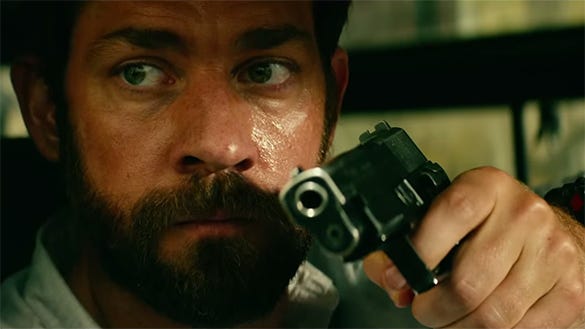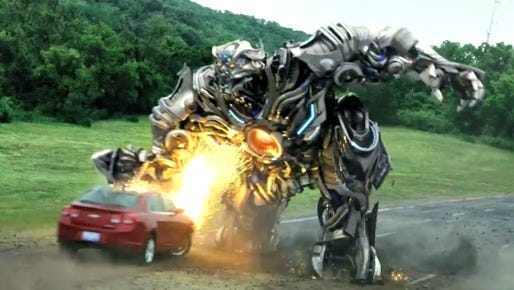13 Hours: The Secret Soldiers of Benghazi

No matter how loudly director Michael Bay insists to the contrary, “13 Hours: The Secret Soldiers of Benghazi” is hardly an apolitical action film.
The very word “Benghazi” acquired a permanent stain of politics the second Americans learned where it was located. Of course this film is political. It has to be.
With harrowing, horrifying clarity “13 Hours” reenacts the Sept. 11, 2012 siege of a U.S. diplomatic outpost — and a nearby classified CIA compound — in Libya by militant Islamic terrorists. Nearly 200 gunmen swarmed all night with RPGs, hand grenades, assault rifles, diesel canisters, machine guns and mounted artillery. Four Americans died, including the first U.S. ambassador slain on duty since 1979.
Frankly, anything not somehow political would feel as distasteful as a dramatized coroner’s report or as dry as the recitation of an investigative committee’s findings.
So yes, “13 Hours” is political. Aggressively so. What it’s not is partisan or propaganda. When Bay says it’s not “political,” that’s what he means. (The real anger should be how deeply discourse has eroded that “political” doubles for either pejorative.) Specifically, “13 Hours” never even references the actions, or lack thereof, of a certain presidential candidate. And even if it were partisan or propaganda, does anyone think an election can be swayed by a man who made this image?

While "13 Hours" offers much for conservatives to crow about and for liberals to laugh off, those truly paying attention will find both sides considered to a conclusion of far more complex anger than you might expect, especially from a director best known for basically just sculpting ’splosions for the last 20-plus years. Was it wrong for U.S. personnel to remain in Benghazi when warning signs of an attack were imminent for weeks? Yes. But it also wonders why the hell we were there in the first place, a long-memory lament that lingers beyond contemporary conflicts or administrations.
The “secret soldiers” of whom its subtitle speaks are members of GRS, a six-man squad of private security contractors that mounted the only meaningful defense of either the diplomatic outpost or the CIA compound. They were expressly hired to protect the latter, and the people working it, but issued a blunt, and retroactively ominous, assessment of ambassador-residence security: “This is some real dot-gov shit.” This penny-pinching, “13 Hours” suggests, was seen as a move to minimize the perception of American heft, as was 17 Feb — a rag-tag group of supposed Libyan sympathizers. They were more like rent-a-villagers, given guns and $28 a day to patrol the compound without strategic or tactical experience. At the very least, the attackers learned the name “17 Feb” and exploited it. At worst, 17 Feb took part.
At the CIA compound, dozens of operatives gather intelligence to keep tabs on a flood of weapons funneling into a failing state after the fall of longtime dictator Muammar Gaddafi. (One suspects an early scene of a farmers market with weapons isn’t terribly exaggerated.)
GRS is there solely to be “hired help” for them and to “act like it,” says the station chief (David Costabile). Even as they see the ambassador’s residence roiling with flames, the chief insists they stay behind. But their own consciences send them charging in to save whomever they can from the residence. Hours after that assault, they withstood several waves of attacks at the CIA compound — including a pre-dawn mortar shelling that claimed two more lives. Despite entreaties to the U.S. and its allies, there were no gunships. No drones. No flybys. Just firepower and fortitude.
The two leads of the film are GRS security crew pointman Tyrone "Rone" Woods (James Badge Dale, a charismatic and chameleonic character actor who appears to have doubled his weight in muscle here) and new guy Jack Silva. In an even bolder gamble against type, Jack is played by John Krasinski — best known as Jim Halpert, the lovably harmless beanpole goofball on NBC’s “The Office.” Similarly beefed up, Krasinski swaps his deadpan Jim face for a gripping grimace of woe — a man who immediately regrets the decision to reenter the fray despite the financial necessity.
There’s also Kris “Tanto” Paronto (Pablo Schreiber, aka Pornstache on "Orange is the New Black"), a hotheaded U.S. Army Ranger tired of hearing the Shining City on a Hill rhetoric over and over; Dave "Boon" Benton (David Denman, also of "The Office"), a sniper with Zen calm; John "Tig" Tiegen (Dominic Fumusa), the tech man; Mark "Oz" Geist (Max Martini, "Pacific Rim"), the added muscle; and Glen “Bub” Doherty (Toby Stephens, TV's "Black Sails"), a friend of Jack’s who tries to cover the 400 long miles from Tripoli to Benghazi to aid his men.
“13 Hours” isn’t afraid to let the nerves of these men trump their nobility. It’s in their tetchy skepticism of sit-reps that don’t jive with the intel of their own two eyes. Their cold comfort of “a good call home today,” as if they could comfortably die knowing that went well. The inference that bailing early on the battle would threaten their livelihood as no one would ever stand beside them afterward.
But it’s never more apparent than in their conversations during rare respites from the fight.
“What are my girls going to say about me?” Jack asks Tyrone. “That he died in a place he didn’t need to be? In a battle he didn’t understand? In a country that meant nothing to him?” That could have just as easily been said 15 years ago about an entirely different nation and carried the same resonance. "When we were young, it felt like something bigger," Tyrone replies. "Something bigger's gone."
We see not only Americans’ bodies crudely covered on a tarmac, but also those of the terrorists — hovered over by mourning families in a birth, or bolstering, of militias full of more murderous martyrs. Among the GRS men who make it out alive, some grouse about medals they won’t receive. “What do we get?” one asks. “We get to go home,” another retorts. “I have intel to gather,” insists the CIA station chief once evacuations begin. The translation: He has masters to serve.
The clear implication — in a script by Chuck Hogan adapted from a book of the same name — is that all the attachés, agents and enlisted men & women will have to keep returning to this hell again and again. The opening music fanfare recalls “Taps,” a reminder of this emptiness and not the enemy. You might expect the final shot of an American flag. You may not expect to see it battered and befouled, sinking in a pool under the weight of charred detritus.
Indeed, “13 Hours” finds Bay turning on the very military-industrial complex you’d expect him to embrace. It feels like a major tipping point. Save the camera leering across a buxom woman, it also feels, well, like a Michael Bay movie — albeit one that borrows more than its fair share of the best parts of “Black Hawk Down” (which one GRS member references and whose editor, Pietro Scalia, helped cut this film).
At only two points does Bay indulge in his usual excess to the film’s detriment. An early second-act car chase, in which bodies pinball beneath speeding sedans, feels like a “Bad Boys II” outtake. More egregious: He revisits his falling-bomb POV shot from “Pearl Harbor.” The terror of the hellfire raining down at that moment is readily apparent; it needs no gimmick to goose it.
The action and atmosphere otherwise feels raw, ragged, merciless. Bureaucratic hurdles prove as nightmarish as the confusion of friend and foe on the ground. Tanto’s continuous query of “Chief, are we expecting any friendlies?” is recited so often it starts to feel like an absurdist refrain of routine. “I’m not a bad guy, but I know bad guys,” says one alleged member of 17 Feb; we never learn whether it’s meant to be a relief or a ruse. Tig and the CIA operatives even carefully watch security-camera footage of a nearby sheep field; they can’t tell if the animals are procreating … or if their skittish movement means enemies are crawling beneath them.
Through Boon, “13 Hours” quotes Joseph Campbell’s “The Power of Myth,” specifically, “All the gods, all the devils, all the heavens are in you.” What seems like purty-mouthed warrior-poet window dressing actually plays into the powerful complexities of the political philosophies at play: It is OK to believe in something and, in the presence of its persistent failures, change how you feel. To be intractable is a certain path to madness, ruin and death.
In “13 Hours,” Bay has made a film that stares down the absurdity of 21st-century American warfare politics with the force, and deadly efficiency, of a howitzer.


